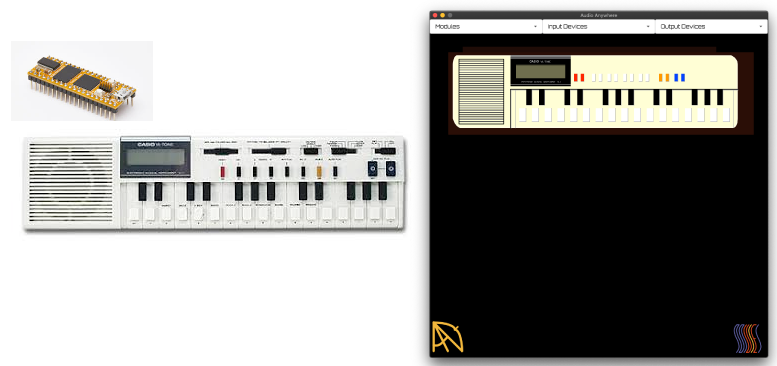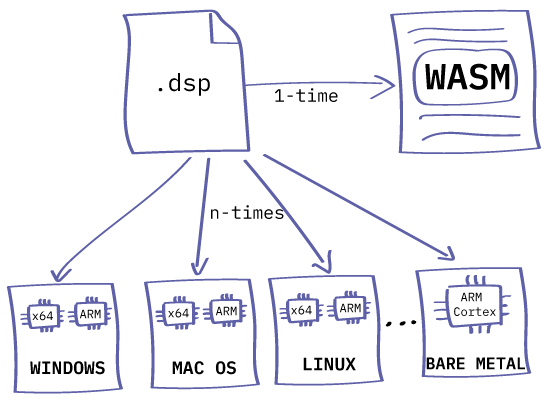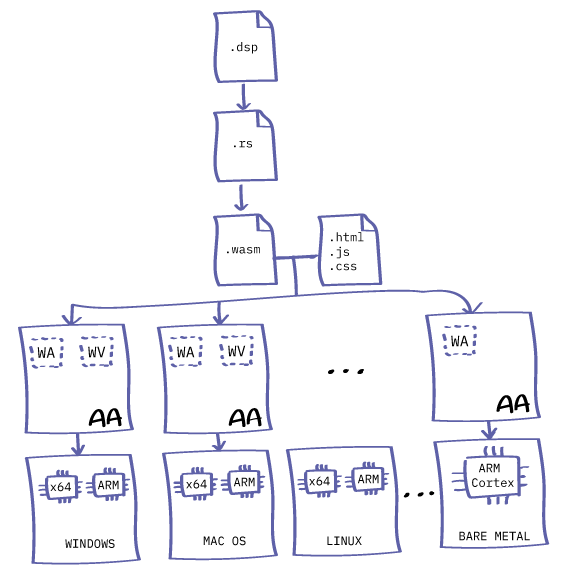Audio Anywhere
Rust Edinburgh, September 2020
Benedict R. Gaster /
@cuberoo_
my pronouns are he/him/they or xe/xim/xir

Material related to this talk
- Slides can be downloaded here: https://bgaster.github.io/presentations_reveal/rust_meetup_edinburgh_09_2020/
- Project home page
- Source code is at https://github.com/bgaster
- Up and comming paper: Gaster, Benedict R. and Cole, Max. (2020) Audio Anywhere with Faust. To appear in Proceedings of the 2ndInternational Faust Conference (IFC-20), December 2020


"WebAssembly (abbreviated Wasm) is a binary instruction format for a stack-based virtual machine. Wasm is designed as a portable compilation target for programming languages, enabling deployment on the web for client and server applications."
W3C Working Group
This got me wondering...
Wasm is not limited to the Browser
A number of projects to run Wasm natively
Alon Zakai, 2020
Wasm could imply, compile once run anywhere

Things would be different one day. But you had to start small, like oak trees.
Tiffany Aching


AA Module

Hosting App Loads Bundle
{
"wasm": [String],
"gui": String,
"info": {
...
"inputs": int,
"outputs": int,
...
}
}
Single hosting app for each supported platform

AA Bundle
- URLs: module.wasm(s), each one implements the AA Wasm API for nodes in audio graph;
- URL: gui.html, implementing the Javascript API for UI plugins; and
- Set of configuration parameters, which are defined as part of the module bundle itself and describe its capabilities, parameter mappings, and initialization constants
Audio Anywhere Wasm API
AA Wasm API (1)
// initialize module
#[no_mangle]
pub fn init(sample_rate: f64)
// module meta data
#[no_mangle]
pub fn get_sample_rate() -> f64
#[no_mangle]
pub fn get_inputs() -> u32
#[no_mangle]
pub fn get_outputs() -> u32
#[no_mangle]
pub fn get_voices() -> i32
AA Wasm API (2)
// parameters
#[no_mangle]
pub fn get_param_index(length: i32) -> i32
#[no_mangle]
pub fn get_num_params_float() -> u32
#[no_mangle]
pub fn set_param_float(index: u32, v: f32)
#[no_mangle]
pub fn get_param_float(index: u32) -> f32
// MIDI
#[no_mangle]
pub fn handle_note_on(mn: i32, vel: f32)
#[no_mangle]
pub fn handle_note_off(mn: i32, vel: f32)
AA Wasm API (3)
// compute audio
#[no_mangle]
pub fn compute(frames: u32)
// input and output buffer management
#[no_mangle]
pub fn get_input(index: u32) -> u32
#[no_mangle]
pub fn get_output(index: u32) -> u32
#[no_mangle]
pub fn set_input(index: u32, offset: u32)
#[no_mangle]
pub fn set_output(index: u32, offset: u32)
// extern functions provided by AA Host
extern "C" pub fn set(index: u32, v: f32)
Writing the audio component
FAUST (Functional AUdio STream) is a domain-specific purely functional programming language for implementing signal processing algorithms in the form of libraries, audio plug-ins, or standalone applications.
AA Faust Example
declare aavoices "2";
import("stdfaust.lib");
process = vgroup("voices", par(n, 2, vgroup("aavoice%n", voice))) ;
voice = hgroup("midi", osc(freq))
with {
freq = hslider("freq",200,50,1000,0.01);
gain = hslider("gain",0.5,0,1,0.01); gate = button("gate");
envelope = en.adsr(0.01,0.01,0.8,0.1,gate)*gain;
osc(freq) = os.sawtooth(freq)*envelope;
};
Implementation
Compilation flow for AA DSP Code

AA module static memory layout

Compile Faust to Wasm via Rust
- Why Rust?
- Rust is a particularly close friend to Wasm, but
- It also provides a root to auto-vectorization and Wasm-128 SIMD
- All the supporting libraries are written in Rust
Compile Faust to Rust
faust2audioanywhere synth.dsp
Fork of Faust compiler for AA on my Github
Generated Rust for Faust .dsp
struct mydsp {
...
}
impl mydsp {
pub fn get_voices(&self) -> i32 { ... }
pub fn get_input(&self, index: u32) -> u32 { ... }
pub fn get_output(&self, index: u32) -> u32 { ... }
pub fn get_num_outputs(&self) -> i32 { ... }
pub fn handle_note_on(&mut self, mn: Note, vel: f32) { ... }
unsafe fn compute(
&mut self, count: i32, inputs: &[T], outputs: &mut [&mut [T];2]) { ... }
pub fn compute_external(&mut self, count: i32) { ... }
}
Generated compute_external function
pub fn compute_external(&mut self, count: i32) {
unsafe {
let (output0, output1) =
(::std::slice::from_raw_parts_mut(OUTPUTS[0], count as usize),
::std::slice::from_raw_parts_mut(OUTPUTS[1], count as usize));
self.compute(count, &[], &mut [output0, output1]);
}
}
generated compute function
#[target_feature(enable = "simd128")]
unsafe fn compute(
&mut self, count: i32, inputs: &[T], outputs: &mut [&mut [T];2]) {
let [outputs0, outputs1] = outputs;
let (outputs0, outputs1) = {
let outputs0 = outputs0[..count as usize].iter_mut();
let outputs1 = outputs1[..count as usize].iter_mut();
(outputs0, outputs1)
};
...
let zipped_iterators = outputs0.zip(outputs1);
for (output0, output1) in zipped_iterators {
...
*output0 = ... ...
*output1 = ... ...
}
}
But how does it run in practice?
Faust copy processor - C++ vs Rust
| C++ | Rust | Rust Optimized |
|---|---|---|
| 84860.747 MB/sec | 3379.915 MB/sec | 88353.927 MB/sec |
- Original Faust to Rust compiler, 20 times slower than C++
- Optimized Faust to Rust compiler, slightly faster than C++
Null function call

Sine OSC

Copy 1 channel in/out

Next steps
Wasm lacks relocatable code

